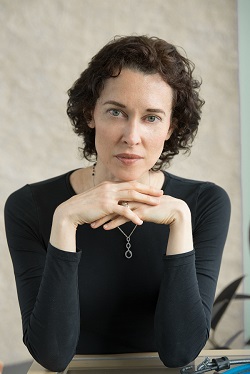An expert in tissue engineering who recently received the prestigious NIH Director’s Pioneer Award will deliver a public talk Nov. 18 about lessons learned from biomaterials used in orthopedics and plastic surgery.
Jennifer Elisseeff is the fall 2019 speaker in The John R. and Donna S. Hall Engineering Lecture Series. Elisseeff is the Morton Goldberg Professor and Director of the Translational Tissue Engineering Center at Johns Hopkins Department of Biomedical Engineering and the Wilmer Eye Institute. She holds appointments in Chemical and Biological Engineering, Materials Science and Orthopedic Surgery.
Elisseeff will summarize the translation of biomaterial technologies originating from the lab for tissue reconstruction in orthopedics and plastic surgery. Her talk is Monday, Nov. 18 at 4:10 p.m. in the Jacobs Believed in Me Auditorium in Featheringill Hall. The event free and open to the public, and a reception will follow from 5 to 6 p.m.

“Clinical translation provides a unique and critical opportunity to investigate the key therapeutic drivers of technology efficacy in people,” she said. “A key outcome of our clinical translation experience was the discovery of unexpected adaptive immune cells around implants and recognizing the critical role of the immune system in the biomaterial response and tissue repair outcomes.”
Re-evaluation of design parameters is central to improving research and design, Elisseeff said.
In October 2019 she received a Director’s Pioneer Award from the NIH High-Risk, High-Reward Research Program. The award, which supports $700,000 in direct costs annually for five years, will enable Elisseeff and her lab to investigate new roles that immune cells can play in the process of healing.
She is a Fellow of the American Institute of Medical and Biological Engineering, the National Academy of Inventors, and a Young Global Leader by World Economic Forum. In 2018, she was elected to the National Academy of Medicine and in 2019 the National Academy of Engineering. She has received multiple honors for her work in the development and commercial translation of injectable biomaterials for regenerative therapies.
However, ongoing research prompted Elisseeff to shift direction. Her focus now is more on exploration of the body’s own immune system as a primary avenue for tissue repair and regeneration.
Elisseeff has founded several companies, including Cartilix, Inc., a startup that translated adhesive and biomaterial technologies for treating orthopedic disease, acquired by Biomet Inc., in 2009, and Aegeria Soft Tissue and Tissue Repair, startups focused on soft tissue regeneration and wound healing. She has been a member of a number of industry advisory boards for organizations including Kythera Biopharmaceuticals, Bausch and Lomb, Histogenics and Cellular Bioengineering.
She received a bachelor’s degree in chemistry from Carnegie Mellon University and a Ph.D. in Medical Engineering from the Harvard-MIT Division of Health Sciences and Technology. After doctoral studies, Elisseeff was a Fellow at the National Institute of General Medical Sciences Pharmacology Research Associate Program where she worked in the National Institute of Dental and Craniofacial Research.
The Hall Engineering Lecture Series was established in 2002 to allow the Vanderbilt Engineering community hear renowned engineers from universities, agencies, and industry address engineering topics of particular interest. The series is funded by an endowment founded by James Gray to honor the Halls. John Hall, a 1955 Vanderbilt engineering graduate, is retired chairman and chief executive officer of Ashland, Inc.